Rolling Up Our Sleeves: Interfaith Service Collaboration as a Solution
by Abigail Nathanson, Shinnyo-en Foundation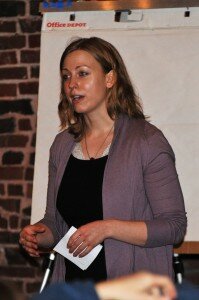
Interfaith service leaders are an eager bunch. I bet they are part of that elusive club of “morning people” I sometimes hear about when my friends and I go around the dinner table sharing urban myths. When I arrived at the seventh annual Breakfast Forum on Interfaith Service and Neighborhood Collaboration at the ungodly hour of 8:15 in the morning on the second day of the 2010 National Conference on Volunteering and Service, the room was already almost packed. I waded through groups of people shaking hands and reconnecting. Still on California time, I nursed my jet lag with several cups of coffee and sat next to two women eagerly discussing the day’s events on the schedule for the interfaith track of the conference. They were among 70 or so leaders from faith, grassroots, government, and corporate backgrounds gathered to hear a panel on the importance of interfaith collaboration in solving real world problems.
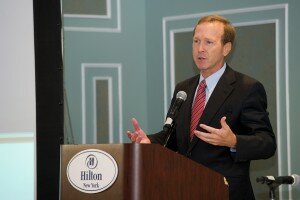 I’m not sure if it was all the coffee I drank or perhaps the infectious energy of the leaders in the room, but I snapped awake as Neil Bush, Vice-Chair of Points of Light Institute (POLI), shared a compelling statistic: 50% of all service in the USA is driven by Faith-based organizations. No wonder this group of leaders were so eager; they are among a powerful group on the frontlines of solving America’s greatest challenges. And judging by the crowd, they didn’t want to waste a single minute.
I’m not sure if it was all the coffee I drank or perhaps the infectious energy of the leaders in the room, but I snapped awake as Neil Bush, Vice-Chair of Points of Light Institute (POLI), shared a compelling statistic: 50% of all service in the USA is driven by Faith-based organizations. No wonder this group of leaders were so eager; they are among a powerful group on the frontlines of solving America’s greatest challenges. And judging by the crowd, they didn’t want to waste a single minute.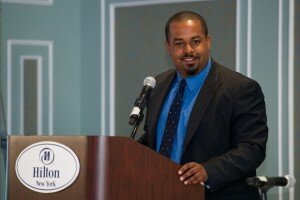
As moderator of the panel, Joshua DuBois, Director of the Neighborhood and Faith-based Partnerships at the White House, reiterated President Obama’s priority to leverage interfaith service as a solution to current problems in the USA. Mr. DuBois asked panelists Eboo Patel, Executive Director of Interfaith Youth Core; Peter Beard, Executive Director of United Way; Haru Inouye, CEO of Shinnyo-en Foundation; and Mark Farr, Director of Faith Engagement at POLI, to discuss current interfaith service initiatives across religions and geographies.
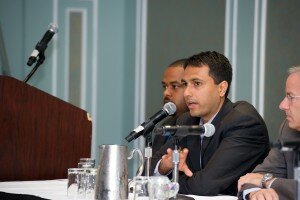 Eboo Patel sited Obama’s early history as an interfaith leader and activist as a role model of what he envisions could become a social norm. Mr. Patel explained the hidden potential of encouraging interfaith conversations to move from “Niche to Norm” and push the concept of interfaith dialogue into everyday conversations, in much the same way conversations about saving the environment have become normalized in everyday conversations over the past few years.
Eboo Patel sited Obama’s early history as an interfaith leader and activist as a role model of what he envisions could become a social norm. Mr. Patel explained the hidden potential of encouraging interfaith conversations to move from “Niche to Norm” and push the concept of interfaith dialogue into everyday conversations, in much the same way conversations about saving the environment have become normalized in everyday conversations over the past few years.
As one of Mr. Patel’s target population–a (fairly) young person looking to make change in the world–I felt inspired by the call to develop better competency in world religions as a basis for finding common ground to work towards peace. Mr. Patel’s message is clear; it’s up to us. Young people need to speak up and become just as strong a force as the fundamentalist extremists who currently dominate conversations about the role of world religions.
From a secular and practical perspective, Peter Beard from United Way described the importance of harnessing the power of faith groups as a way of meeting his organizations’ goals for social change by 2018. Mr. Beard explained that these goals could not be met without support of different faith groups.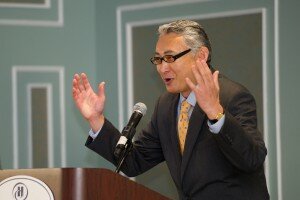
Haru Inouye of the Shinnyo-en Foundation discussed the Shinnyo-en belief as a “borderless garden of truth” in which people from all different backgrounds are able to connect and grow together to create peace. A Buddhist priest, Mr. Inouye called for “One spirit” through interfaith work to accomplish common goals.
Finally, Mark Farr of POLI captured the current needs in interfaith service in two words: centering and de-centering. Mr. Farr explained that “centering” describes the importance of streamlining interfaith service efforts to create an efficient and effective solution to the problems we face. “De-Centering” focuses on keeping all players in interfaith service connected to one coherent conversation rather than succumbing to a “Silo-effect”. Mr. Farr identified this as a time to “roll up our sleeves” and act on the fruitful conversations captured in breakfast forums past.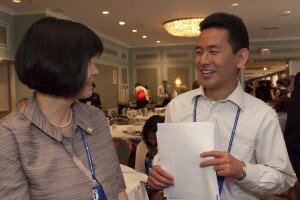
During the question and answer portion, many members of the audience shared stories of strong interfaith-service partnerships taking place across the country. Leaders in the audience described a desire for greater attention to current grassroots initiatives. One woman felt that faith groups were already ‘rolling up their sleeves’ and that really what is needed is better media attention to these instances. Conversation between the audience and panelists underscored earlier points that open dialogue and sharing are critical in connecting faith groups to work towards common goals.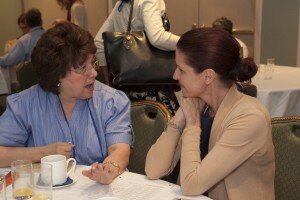
In response to audience questions about increased exposure, Mr. Dubois shared the launching of a pilot in 8-10 cities on interfaith-service partnerships. He pointed out that his office would eventually like to expand this concept to every city and that all faith groups are encouraged to participate.
What struck me during the end of this conversation was just how quickly conversation moved from discussion to deciphering action items. One audience member got out her pen mid-question in front of the whole room to request Mr. Dubois contact information to follow up. Others quickly followed suit. These are the early risers, rolling up their sleeves to mobilize people of all faiths to create peace in the world. I left the breakfast forum feeling energized by a group of people undaunted by the problems we as Americans face today.



One Comments to “Rolling Up Our Sleeves: Interfaith Service Collaboration as a Solution”